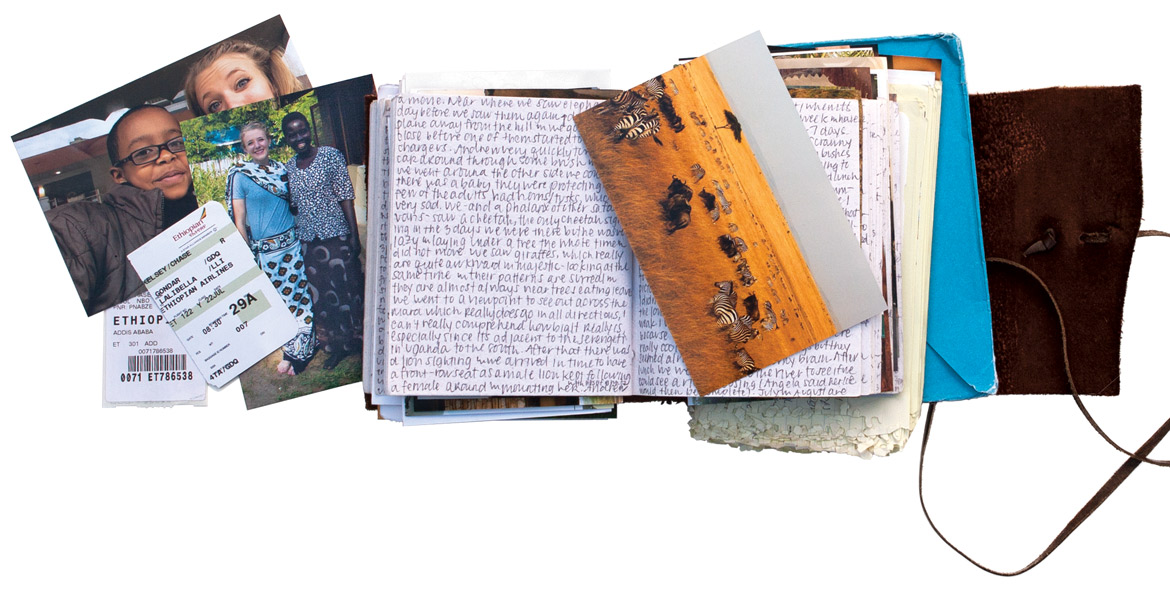By Kelsey Chase McFaul '15
My mother once told me if I wanted to be a good writer, I had to learn to observe. But sitting in the back seat of a car outside the bustling façade of Kaldi’s Coffee — the Ethiopian knockoff of Starbucks, complete with a round, green logo — I felt incapable of observing anything.
I’d been traveling alone in East Africa for four weeks, interviewing African Christians about their faith, conversion stories, and lives. I’d taken pictures, recorded hours of conversations, and filled several notebooks with narratives that would eventually become my senior honors project at SPU.

Kelsey’s journal entries, pictures, and boarding passes are a few reminders of the people and places of East Africa.
But I was also lonely and tired. Outside the open windows of the car, hawkers sauntered with their wares in purple twilight: shrink-wrapped political manifestos in Amharic; cassettes of pirated ’80s rock music; a stacked kaleidoscope of scarves. After 20 minutes of bargaining, the mother of my Ethiopian host family — a seamstress who had sewn her daughters’ wedding dresses — turned around and handed me a length of fabric: navy blue with blocks of metallic gold and red at the hems, the scarf I’d considered buying for myself if she didn’t reach a deal. “I know the colors you like to wear in your clothes,” she told me, “and I think it matches your eyes.”
I had felt incapable of observing anything, yet someone had watched and understood me. It was a moment of relief and comfort that energized me during my remaining weeks.
I had first visited Ethiopia when I was 14. Then, too, I filled a journal with minute observations: a waving lime-green handkerchief in a church service; a mural of clouds and Deuteronomy 33:26 painted on the wall of a coffee-processing plant; the striped layers of a macchiato. When I returned to Ethiopia the second time, I sought out African voices telling African stories.
I incorporated the narratives into my academic experience at Seattle Pacific. As a member of University Scholars, SPU’s honors program, I took three years of classes with a select cohort of students. I double-majored in English literature and political science, and used every opportunity I could to learn about Ethiopia. I did research projects on maternal health-seeking practices, women’s suffrage, and even the relationship between coffee prices and gross domestic product. My friends probably got sick of hearing about Ethiopia.
As a junior, I read Chimamanda Ngozi Adichie’s collection of short stories. Titled The Thing Around Your Neck, it refers to the choked feeling of many African immigrants — not anything as beautiful as a scarf.
As I brainstormed ideas for the honors project required of all senior UScholars, I knew mine would be a collection of short stories inspired by both my summer trip and Adichie’s writing style. In the end, I chose three narratives of miraculous faith, and set them alongside Ethiopian folktales to illustrate how the two inform each other when read side by side.
The stories are threaded with memories of talking until 2 a.m. with my Ethiopian family, watching TV under the covers with their 11-year-old daughter, and attending an Ethiopian wedding ceremony. These descriptions are, in my opinion, more the product of observation than any academic process.
At graduation in June, I wore a red satin stole, the reward for surviving UScholars and an honors project. The stole was a reminder of the Ethiopian scarf and stories. And it was symbolic of where I was headed: to a master's degree in African studies at Stanford University, where I will continue to seek out African stories.